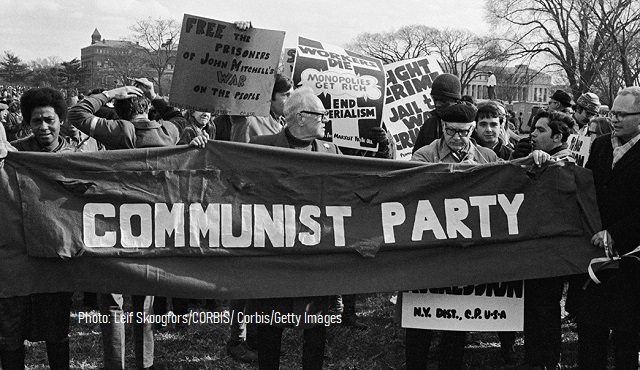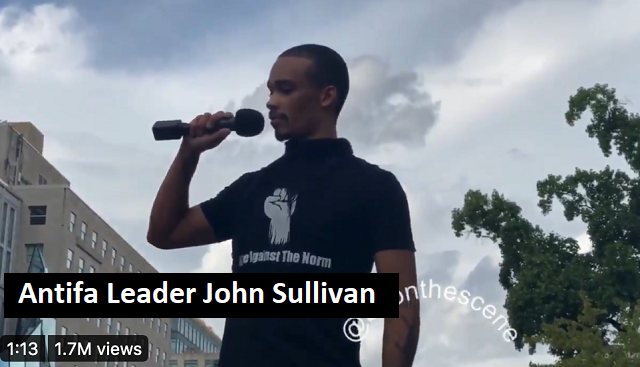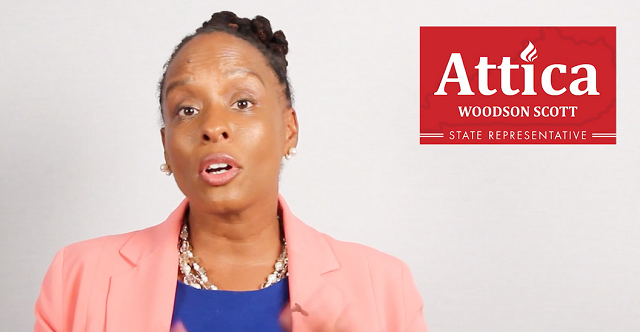
Disconcerting similarities exist between the modern progressive left and the communist movement. Take it from someone who knows.
Tony Salinski, once a student radical and now an expert on communist ideology, identified as a communist for several years during the Vietnam War era. Salinski joins the podcast to explain why he was drawn to communism as a youth and to identify similarities between communism and socialism.
Also on today’s show, we read your letters to the editor and share a good news story about a school principal who is using his skill as a barber to mentor his students.
Listen to the podcast below or read the lightly edited transcript.
How are socialists deluding a whole generation? Learn more now >>
“The Daily Signal Podcast” is available on Ricochet, Apple Podcasts, Pippa, Google Play, and Stitcher. All of our podcasts can be found at DailySignal.com/podcasts. If you like what you hear, please leave a review. You can also leave us a message at 202-608-6205 or write us at letters@dailysignal.com. Enjoy the show!
Virginia Allen: I am joined by professor Tony Salinski, a former student radical in the communist movement. Tony, thank you so much for being here today.
Tony Salinski: You’re welcome. Thank you for having me.
Allen: The topic of communism and socialism is certainly getting a lot of attention in the current political and social climate. And when you were a student, you were a part of the communist movement. Can you just begin by telling us a little bit of your story? How did you come to identify with the communist movement?
Salinski: Well, I was actually for the war. This was back at the time of the Vietnam War. And I started out for the war and, like everybody, debating whether they wanted to enlist or wait until they got they got called, drafted.
And during that time, [President] Lyndon Johnson did a TV special. They call it a special, but he was on TV. He was arguing against the Republicans, who had wanted to get in and get it over with, and get out.
One of the things he said was, “We’re going to stay in there. We’re not going to invade the North. We’re just going to stay in there until we stop them. And it could take 50 years.” I thought to myself, “Fifty years? Fifty years of guys just getting killed to finally just out-kill these guys.” And that started me to think, “This is not for me. I don’t want to do this.”
Push comes to shove later. I was looking into means of getting out legally of the draft and went to a meeting house, where a number of different groups were present. And one of them was a communist group.
I was interviewed briefly by the people sponsoring the event. And they asked me if I would have fought in World War II, and I said, “Well, yeah. Absolutely.” And they said, “OK, that’s not what we’re looking for. We’re looking for people who wouldn’t fight at all.” And they motioned me over to the communists, and I went over and gathered some information.
Later, I just sort of drifted into them. The resistance was going because there was no other resistance. There was no resistance to what the communists were saying anywhere on the media. There was no Rush Limbaugh. And I was a blue-collar kid and didn’t know anything about “Firing Line” or William F. Buckley or anything like that.
So there was no counter to what the communists were putting out about the war in Vietnam. And I got convinced that it was illegal and that it was immoral. And … one thing led to another. …
I was in a rock band at that time. And that was the big draw that drew the communists to me. We were doing pretty well and getting good audience responses around the city of Pittsburgh. And eventually we started doing some shows for them. And one thing led to another and I was involved.
They asked me, probably on three separate occasions, to join the party. And I told him the same thing every time, I said, “Nixon’s got a list, an enemies list, and I don’t want to be on that list. But I can work with you and help you out, as we go here, without being a member of the party itself.”
And we came to that agreement and they stayed with that. And from then on, it was just a matter of just going to the events that they put on and helping them with this and that, and the other thing, and bringing the band.
Allen: I find that interesting. You didn’t join the party, but you were in the movement for a number of years, in the communist movement. What was so appealing about the communist movement to you, that kept you in it, that kept you saying, “I’ll support you all. And I’ll be a part of what you’re doing”?
Salinski: Basically the idea that they were doing something. They were active. They knew what their motives were. They knew that they wanted out of the war. And I agreed with that, at first.
They were organized. They could bring out a crowd like nobody’s business. It was amazing to see how they were able to put a lot of people together, to come out and make their point.
But I was never fully into the idea of destroying the United States of America. That was a problem for me from Day One. And they got around that by saying, “We don’t want to destroy the United States. We simply want to improve it.” And I bought it. I was 19 years old, 18 years old, at the time, and I bought it.
But that was it. Ideologically, I didn’t get really aware ideologically until near the end. And things started to become clearer and clearer and clearer. And I realized that from the very beginning, everything they had said was in one way or another a lie. And I just finally couldn’t stand that.
I kept confronting them, asking them, “What about this? What about that?” And I kept getting variations on the same answer. “You’re just not ready for the whole story yet.” And I, being 19 years old, I knew everything, anyway. I thought, “Well, yeah, I am ready for the whole story. Why don’t you just tell me?” But it just kept going on and on and on like that. And finally, I just dropped away.
Allen: They were almost kind of teasing you along, giving you little bits of information, but never totally upfront and candid, it sounds like, about, really, what ultimately their mission was.
Salinski: Right. And they did that to everyone, except the people who walked up and said, “I want to join the Communist Party USA.” Those people got moved to the head of the line, so to speak, but the rest of us were just drifting in varying degrees of commitment, varying degrees of understanding. And yeah, they sort of reeled us in gradually.
Allen: So fast-forward to today. And what do you know of the communist movement’s activity today? I mean, some of the unrest that we’re seeing in the streets, can we directly link that back to communism?
Salinski: Well, when I got out of the movement, … I didn’t want any parts of any of it. My wife at the time said, “If you’re drafted, are you going to go to Canada?” I said, “No, if I’m drafted, I’m going to go to Vietnam.” OK? I had just gotten sick of the whole thing. And after getting away from it for a little while, … I got into the Democratic Party.
I was … semi-active as a Democrat and paid attention to all the news and everything like that. And I realized, “Wait a minute, these people are the communists on slow motion. They’re active. It’s the same thing. What they want is the same thing. They just don’t want to do it as fast.”
The communists, they were in the process at that time of switching from Leninist tactics in the street, in-your-face revolution, to Gramsci. And the idea of a gradual movement into a revolutionary pattern that wasn’t in your face wasn’t on the street.
… That really put me off because I just wanted to get it over with and get things straightened out, as they said.
But yeah, from the Democratic Party then, I’m moving on and watching these people. And what happened was, … it took a very short time, a year or so, before I just started watching them, watching everything they were doing.
I felt strange because my dad used to always say, “Oh, that’s communist.” I’d say, “Oh, dad, yeah. I know there’s a communist under your bed.” Well, there was, they were everywhere. And whether they call themselves communists or not, they were, in my estimation, communists because the goals were the same. The tactics were a little different, but the goals were the same.
One of the last things that they did that really pushed me away was they come up to us one day on the street. And this had come down from, not an activist, an agent, actually, a KGB agent, who had been identified to me on the streets several times. He was, I guess, code named Andre.
Andre had passed on this information that we were going to completely change our tactics. And I said, “What are we going to do?” “Well, you’re going to stop calling yourselves communists.” I said, “Really? Well, what are we going to call ourselves?” “We’re going to call ourselves liberals, progressives, socialists, anything but communists.”
Allen: Wow.
Salinski: So from that point on, if you identified yourself as a liberal, I just said, “Okay, check one communist. Progressive, check another as communist.” And what I’m seeing today, in my mind, validates that.
Allen: Wow.
Salinski: Well, Antifa is and Black Lives Matter is more a return to Leninist tactics. They’re out in the street, obviously burning things down, and pushing people around, and so on and so forth.
But the main communist movement is behind them and is still chugging along with their idea of … moving the country gradually over the past, what is now 50 years since this all happened. I’m watching it. Never, never stop moving to the left. It’s always moving left.
Allen: So walk us through how exactly the Communist Party does go about enticing people. I mean, how have they essentially infiltrated the left to where we are seeing this kind of radical takeover and this radical progressivism push forward, that is very different from what I think the left used to look like?
Salinski: Well, their motive has been all along to identify areas that certain groups, certain constituencies, and when it gets down to it, certain individuals, like myself, are interested in.
They had a gold mine there during Vietnam because they had a war that nobody wanted to get into. And they used that to pull people in. But whatever it is, housing, jobs, anything that they can name that a group is interested in, they will use, even if they’re counter to each other. …
They’re promising one group this, promising the other group that, and this and that cancel each other out. But as long as those two groups don’t figure that out, they’re drawing people in.
Allen: In your own experience, how open and honest are communists actually about their goals?
Salinski: Depends on where you are in the program. Up at the top, yeah, they’re free and easy with talking about what they want to do, destroying the United States, as we know it. And then ultimately destroying all nations, and all boundaries and borders. But below the top level, it’s just what you’re given to know, what you’re supposed to know, and you move on from there.
But the word “honest” and the word “communist” should never be used together in a sentence because they’re not honest.
Allen: Interesting. You have explained, during previous presentations, that the Communist Party really sees themselves as being at war when they’re spreading their ideology. Can you just explain that a little bit more, what you mean by that?
Salinski: Well, yeah. And this was early on too, I didn’t get this late in the program, this was upfront. “We are at war.” Now, I didn’t tumble to all that that meant, but the phraseology was, “We’re at war. And that means anything goes.”
Marx said that the definition of morality is that which advances the revolution. And I found that to be true with them. That’s what morality is. …
One of the things that really frustrates me, when I’m dealing with people who are not real knowledgeable about this stuff, is that idea that they think we’re playing by the same rules that we’ve always played by.
There’s a Democratic Party, there’s a Republican Party, everybody’s agreed on the fundamental principles of right and wrong, but that’s not where the communists are.
They are at war. They are going to do anything, anything it takes to win. There’s no ground for agreement or crossing the aisle or any of that stuff. It’s just, they’re going to take advantage of every situation that offers itself. And they’re going to use that situation to win. It’s the end justifies the means, in every case.
Allen: Well, I find it fascinating that you say that because I think increasingly in the nation, that’s what we’re seeing. You’ve been through things like cancel culture, that there’s no room for disagreement or difference.
Salinski: Right.
Allen: And we’ve seen, sadly, this real interest among young people in socialism. In your opinion, what separates socialism and communism? Does one naturally kind of deteriorate into the other?
Salinski: Well, I agree with Lenin, the end, the result of all socialism is communism. There are arbitrary demarcations drawn along the historical line, but they’re arbitrary and … the moment they can be pushed aside, the moment they can be disposed with, they’re going to be disposed with.
This is an argument I have with so many people in our own movement, “Oh, well, he’s not really a communist.” No, not yet, but he’s headed there.
There’s a difference between their conception of economics, and communism is an economic system in the end. They believe in what’s called a closed economic system. There’s X amount of dollars, or whatever we want to refer to the resources as, and that’s it. You have to move that around to people in the fairest possible way, ideally, absolute equality.
But capitalism is based on an open economic system. You don’t have enough wealth? Well, go create some. And that’s what we do. … I learned that in college, that was long, long, past the communist phase of my life.
But when I learned that, it became crystal clear to me why some people are drawn to communism or socialism or any ism that says it’s going to share the money. Well, yeah, because there’s only so much, and if you have too much, then I have too little. But that’s not reality. I mean, wealth is always being created.
Allen: You mentioned in college, that was where your capitalist views kind of were cemented. And that’s wonderful, that for you that was your experience. But I do find that sad, that today, we see the exact opposite, that young people go to college and they are somewhat radicalized. They are introduced to socialist and communist ideas. And maybe that capitalist background that they grew up with is kind of lost to the wayside.
What do you think is the responsibility of educators, parents, mentors, to actually be speaking to the younger generation, honestly, about the realities of socialism and communism?
Salinski: Well, I think that their responsibility is to go there and do that and open up that conversation. But at this point, you’re going to lose … Well, even back then, it was the case. But now, it’s even more the case. You’re going to risk losing your sons and daughters because they’re bought into it.
And I should add that I was not educated in capitalism in college. I drew that from the opposite of … Everything they said was bad, I thought, “Well, that sounds pretty good to me. That actually doesn’t sound bad at all.”
So it was not that they were out there promoting capitalism at that time. I just drew that from what they were promoting. Because I had already been there, I had seen the whole communist thing up close, and thought, “Yeah, yeah, yeah. That’s not true. What you’re saying there won’t work out.”
And certain times you could speak that out and say, “Well, my experience is this,” and you’d get support. And other times, you just learn to keep your mouth shut, if you want to get that grade and get out, where you can do some real damage, which I did.
Allen: Yeah.
Salinski: I ended up teaching college, and in my classroom they got the truth. You know when I say they got the truth, they got both sides, they got a fair treatment of communism and a fair treatment of capitalism.
I have to tell you, once it’s laid out like that, I used to finish the course with just a little … Well, other things that they had to do. But one of their tasks at the end of the course was to write me a two-page paper on what they thought of the material in the course, regarding communism and capitalism, and 90% of them plus went for capitalism when they realized what the difference was.
Allen: Well, I think, unfortunately, few college students today have a professor like you that will clearly lay out both sides.
So are there any resources that you would recommend for young people who, they’re in college, they’re facing, essentially, being indoctrinated with these ideas and they just want to hear both sides of the argument. Are there certain books that you would recommend or individuals, maybe, to look up on YouTube?
Salinski: … First of all, the Constitution, including the Bill of Rights, the Declaration of Independence, they should become familiar with that. And the history behind it, that in itself is quite a task, but they need to do that. But writing’s more directly concerned with it.
What started me off was W. Graham Sumner. I don’t know if you ever heard of Sumner, but he was an anti-socialist back in, I think he died in 1910 or something like that, in 1912. So he was in the Progressive Era and he was noted as an anti-progressive, but he frequently got onto outing socialism and just laid out the differences.
Salinski: Let’s see, [Antonio] Gramsci, or not Gramsci. Well, they should read Gramsci. They should read something of Gramsci because that tells them what they’re hooked up in now. They should read “Rules for Radicals,” if they haven’t already. Which is, again, a Marxist source, but it lays out what they’re being asked to do and why.
Any of the writings from [The Heritage Foundation]. OK? Any of the writings from people like Pat Buchanan, back in the ’90s, especially. There’s a lot of material out there. They have to look it up though.
Allen: Absolutely. How can our listeners follow your work?
Salinski: Through ACAT, mostly. And I do some things around here. I’m doing a speech on the 29th about communism. Well, it was originally in a library, but then this coronavirus came along and shut the library thing down. So they’ve moved it across the alleyway to a church over there.
You could look me up online. I’m trying to think of whether most of my talks are still up there. I know we took a lot of them down, but they have a way of getting back up there. So you could just look up my name and see what comes out in that, but always through ACAT, Anticommunist Action Team. That’s where I’ll be.
Allen: Great. Thank you. So that’s the Anticommunist Action Team.
Salinski: Yeah.
Allen: We’ll be sure to link that in the show notes today. Tony, thank you. We just really appreciate your time and you coming on and talking about your own personal experience, really fascinating.
Salinski: Well, thank you very much for having me.
COLUMN BY
Virginia Allen is a news producer for The Daily Signal. She is the co-host of The Daily Signal Podcast and Problematic Women. Send an email to Virginia. Twitter:
RELATED ARTICLES:
Looking Back: Combating Tyranny, Waste, and Economic Devastation of ‘Green’ Agenda With Free Enterprise
The State of Race in America Today and Yesterday
ICYMI: 10 Examples of Defensive Gun Use Underscore Second Amendment’s True Purpose
A Note for our Readers:
Democratic Socialists say, “America should be more like socialist countries such as Sweden and Denmark.” And millions of young people believe them…
For years, “Democratic Socialists” have been growing a crop of followers that include students and young professionals. America’s future will be in their hands.
How are socialists deluding a whole generation? One of their most effective arguments is that “democratic socialism” is working in Scandinavian countries like Sweden and Norway. They claim these countries are “proof” that socialism will work for America. But they’re wrong. And it’s easy to explain why.
Our friends at The Heritage Foundation just published a new guide that provides three irrefutable facts that debunks these myths. For a limited time, they’re offering it to readers of The Daily Signal for free.
Get your free copy of “Why Democratic Socialists Can’t Legitimately Claim Sweden and Denmark as Success Stories” today and equip yourself with the facts you need to debunk these myths once and for all.
EDITORS NOTE: This Daily Signal column is republished with permission. ©All rights reserved.















